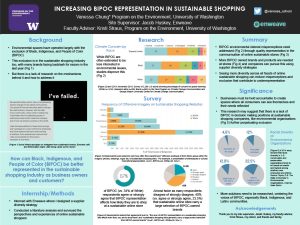Increasing BIPOC Representation in Sustainable Shopping
There is a prevailing exclusion of Black, Indigenous, and People of Color (BIPOC) in the environmental movement, and the sustainable shopping industry is no exception. While there has been a lot of media calling attention to the need for more representation in this industry, there is a large gap in academic research. The intention of this work is to better understand underrepresentation in sustainable shopping, particularly how BIPOC are impacted as businessowners and consumers and how to address it. For my internship with Enweave, I designed a supplier diversity strategy to guide our company in partnering with and supporting more BIPOCowned brands. I researched established strategies of other companies and systematic inequalities specific to the sustainable shopping industry, and conducted a survey on the perspectives and experiences of people who shop at sustainable online stores. My research supports how common misperceptions and exclusion of BIPOC in environmental spaces may likely perpetuate exclusion in the sustainable shopping industry as well. From my survey, consumers feel that sustainable shopping contains some areas of underrepresentation. Creating diversity strategies that center on creating quality partnerships with BIPOC-owned brands and increasing the number of products carried by these brands, is a major way sustainable stores can address this representation gap in sustainability. The sustainability industry can be more inclusive and equitable when businesses are held accountable to create spaces where all consumers can see themselves and their needs reflected.
